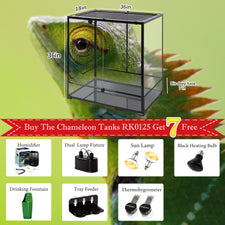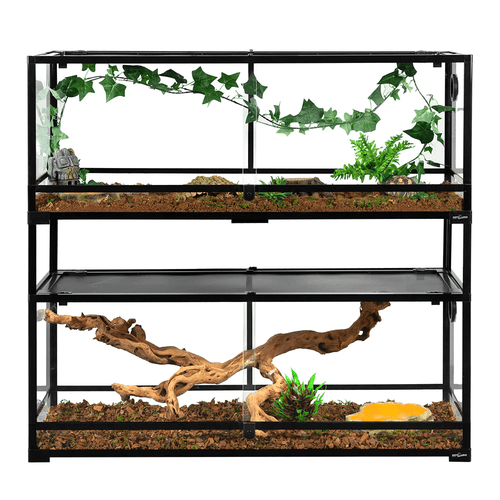The single most important thing you can do to keep a bearded dragon tank from smelling is to clean it regularly. Cleaning the enclosure once a week or once every two weeks is often enough. You'll also want to make sure that your beardie doesn't poop in its terrarium, which can be difficult for some lizards because of their fast metabolism and tendency toward constipation. In addition, if you have other pets like dogs or cats that go outside, then there's always the chance that they might bring dead insects or roaches back into the house, which could end up rotting in your reptile tank if not cleaned out immediately!
If you have a bearded dragon terrarium, you might find yourself wondering how to keep the tank from smelling. This can be especially tricky if your reptile is still young and has not yet learned to use the toilet. When this happens, it's important to clean up after your pet and make sure that any dead insects or roaches are removed from the enclosure. You should also regulate the temperature of your enclosure so that it doesn't get too hot or cold for your beardie friend.
If you're wondering how long UV light bulbs last in a bearded dragon terrarium, we recommend replacing them every six months at most (though some people do use them longer). If you notice any flickering coming from one of these bulbs over time, then it's probably time for an upgrade!
Keep the bearded dragon tank clean
Clean your bearded dragon's habitat at least once a week. You can do this by putting on some gloves and washing them with warm water and a mild non-toxic soap solution. The best way to do this is to fill the bathtub up with enough water to cover the whole tank of water, then let it sit for a few hours before rinsing off all of the soap using warm water that has been run through a filter or charcoal filter made specifically for aquariums . If you have an aquarium vacuum, use that too! This will help suck up anything left over in between cleaning sessions. After washing, don't forget about drying—you don't want mold growing inside your tank! To dry, simply put away everything except what's necessary until next week's cleaning session; we recommend leaving some extra paper towels around just in case you need them later down the line.
Keep the bearded dragon tank free of pet feces
Keeping the bearded dragon tank free of pet feces is an important step in preventing odors. Pet waste can cause fatal diseases and parasite infections in your bearded dragon, so it's important to remove feces when they are produced. Make sure that you have a reptile litter box with a fine-grained substrate (like wood shavings) or paper towels for your dragon to use as a toilet. Reptile litter sprays are also helpful for absorbing moisture and reducing odor-causing bacteria.
Keep the bearded dragon tank free of dead insects or roaches
The second most common cause of a bearded dragon tank smells the presence of dead insects or roaches. These can be food sources for mites, which can be harmful to bearded dragons. Furthermore, if these pests are left lying around in your pet's tank, they will attract more pests, including flies and ants. It is important to remove any dead insects or roaches from the enclosure as soon as possible because they can become a good source of nutrients for your pet. It is recommended that you clean the tank at least once a week. This will help to prevent any buildup of bacteria and reduce the risk of mites or other pests that cause disease in bearded dragons.
Regulate the temperature of the tank
One of the biggest causes of bearded dragon tank smells temperature. The best way to keep your beardie smelling fresh is to regulate the temperature of its tank. To do this, you'll want to keep their enclosure between 84 and 88 degrees Fahrenheit. This way, they won't feel too hot or too cold and will be comfortable in their habitat. You can also use a heating pad underneath one side of the tank so that it's warmer than the other side of the tank (this will encourage them to burrow into one end). You can also purchase a reptile fogger, which will help regulate the temperature in your tank and keep it from getting too warm. Be sure to use a thermometer to check the temperature every day!
How long do UV light bulbs last in a bearded dragon terrarium?

The lifespan of your UV light bulbs depends on the type of bulb. The bulbs used to provide vitamin D3 should be replaced every six months, whereas the bulbs that provide calcium should be replaced every 12 months. UVB light is used to prevent vitamin D3 deficiency, which causes metabolic bone disease (MBD), and it's essential for healthy growth in lizards. UVA light is used for calcium absorption and the normal development of their shells, eggs, and bones.
Keeping your beardie's habitat clean will help keep the enclosure from smelling.
Keeping your beardie's habitat clean will help keep the enclosure from smelling. Here is how:
- Remove dead insects and roaches. They're not good for your pet, and they'll attract other critters that might be harmful to your bearded dragon.
- Remove pet feces. Do this regularly with a reptile-safe disinfectant solution that removes a wide range of bacteria, fungi, and protozoans—and then rinse it away by misting the tank with water or simply letting it dry out naturally after cleaning (bearded dragons do not like wet habitats).
- Remove uneaten food. Do this daily if possible! Otherwise, try to remove any uneaten crickets or mealworms at least once per week and dump out any uneaten fruit or vegetables and any water in which they have been soaking within two days of use; otherwise, mold will grow on them!
Conclusion
Making sure that your bearded dragon tank doesn't smell can seem like an impossible task, but it's not. It just takes a little bit of effort and a few simple steps. Your beardie will thank you for being happier, healthier, and more active. Be sure to clean your bearded dragon's tank regularly and keep it well-ventilated. Don't forget to disinfect the water bowl, too!










